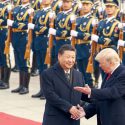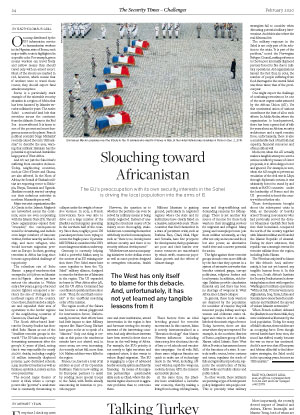Ankara’s relationship with NATO is full of misconceptions
Every time I check my news feed alerts set for “Turkey and NATO,” I see analyses concluding that efforts to improve the relationship are a lost cause.
Some observers claim that Turkey will withdraw from NATO and enter an alliance with Russia. Others argue that the country’s authoritarian turn will continue, with Recep Tayyip Erdoğan possibly staying in power for the next decade or even longer. Still others underscore the fact that Turkish public opinion about its trans-Atlantic allies is alarmingly negative.
Taken together, the claims made by these experts seem convincing. Nonetheless, close scrutiny indicates that the first is superficial, the second highly fragile and the third overrated.
Many analysts view Turkey’s coordination with Russia and Iran in Syria as a dangerous move in the Mediterranean. Many also view Turkish involvement in Libya as taking a step closer toward separating from NATO. Yet these analysts forget that the ability to make such strategic moves is only possible with a security architecture based on NATO membership.
It is true that the purchase of S-400s from Russia and the forging of long-term energy deals indicate an increase in Turkey’s dependence on Russia. Its “frenemy” relationship with Iran sometimes involves moves that put it at odds with NATO allies. Nevertheless, NATO membership is the core component of Ankara’s balanced relationships with Moscow and Tehran. Being a member of the trans-Atlantic alliance is what differentiates Turkey from other countries being bullied by Russia. Its NATO membership encourages Tehran to avoid confrontation and escalation in the Middle East. Moreover, Ankara’s moves in the Mediterranean have not evolved into military confrontation between Turkey and Greece, since NATO prevents an intra-alliance military confrontation.
Rather than a withdrawal from NATO, the most likely scenario is the intensification of intra-Alliance negotiations, in which allies should avoid the transactional approach that gives a free pass to authoritarianism.
Whether it’s the purchase of Russian missiles, military incursions in Syria or engagement in Libya – each move is intended to rally the Turkish public and minimize criticism of a failing economy.
But this strategy may have run its course, as Erdoğan can no longer rely on the ballot box. Especially since his party lost the local elections in Istanbul. Forcing a recount only delivered a humiliating second defeat.
The failure of Erdoğan’s hand-selected candidates in three major cities to win local elections has fueled the opposition and helped establish two new political parties.
More importantly, the recently elected mayors of Istanbul and Ankara, Ekrem Imamoğlu and Mansur Yavaş, both of whom are members of the opposition, are emerging as possible presidential hopefuls.
Yet the argument that Turkey is moving away from the West, even if Erdoğan leaves office, is overblown. In Turkey, public opinion largely follows the opinions of political leaders, whoever they are. It is highly likely that any successor will seek normalization in Turkey’s foreign policy and set its sights once again toward the West.
MEHMET YEGIN
is a visiting fellow in the Americas Division at the German Institute for International and Security Affairs (SWP) and an assistant professor at Istinye University, Istanbul.




